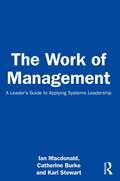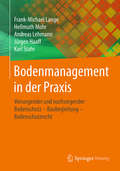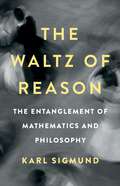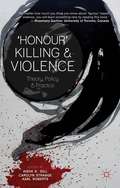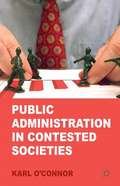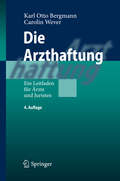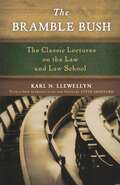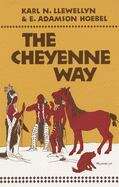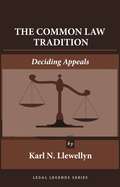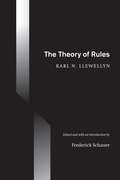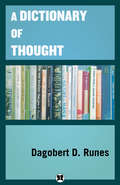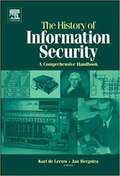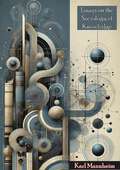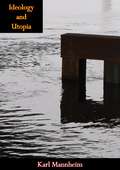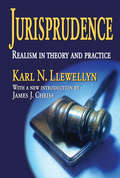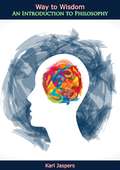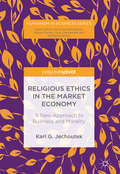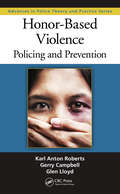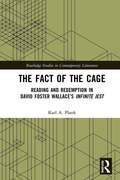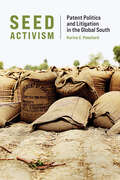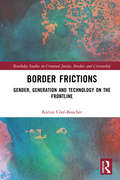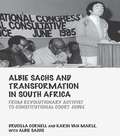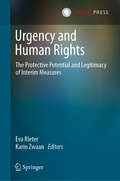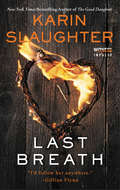- Table View
- List View
The Work of Management: A Leader’s Guide to Applying Systems Leadership
by Ian Macdonald Catherine Burke Karl StewartThe Work of Management demonstrates how the concepts, models and tools of Systems Leadership can be applied, enabling you to become a more effective manager by improving your own work to create a more positive and effective organisation.Positive organisations, where people come together to achieve a productive and personally satisfying purpose, and which provide the basis for a good society, do not occur by chance. They are created by the work of leaders and members who are dependent upon the way the organisation is designed and operates – its structure and systems. While the theory is explained, this book primarily presents the practical aspects – the specific values, methods and tools – that can be used to improve work and the work performance of direct reports. Building on the bestselling book Systems Leadership, this book provides leaders with a manual for the application of concepts as well as an introduction to Systems Leadership Theory, a method that has been used successfully by businesses from large multinational firms and banks, to SMEs, public agencies and NGOs. It provides a predictive capability, allowing a leader to predict what will work well and what is likely to fail, according to the context. It gives the benefit of foresight as decisions must be made.Designed as a leader’s manual for the application of the concepts around Systems Leadership, this book is for people who want to improve their own, and their organisation’s, work practices and performance.
Bodenmanagement in der Praxis: Vorsorgender und nachsorgender Bodenschutz – Baubegleitung – Bodenschutzrecht
by Karl Stahr Frank-Michael Lange Hellmuth Mohr Andreas Lehmann Jürgen HaaffDie wichtigsten Gesetze und Verordnungen werden vorgestellt und die Rechtslage an Hand aktueller Rechtssprechung dargelegt. Erkundungs- und Bewertungstechniken werden beschrieben und kommentiert und die relevanten Normen und technischen Regelwerke sind aufgef#65533;hrt. Das Buch gliedert sich in die drei Bereiche Altlasten, Abfalltechnik - soweit Bodenkundlich relevant - und Oberbodenmanagement. Letzteres wird im Zuge von Ausgleichsma#65533;nahmen zu Bauvorhaben vermehrt von zust#65533;ndigen Beh#65533;rden eingefordert.
The Waltz of Reason: The Entanglement of Mathematics and Philosophy
by Karl Sigmund"A mind-bending jaunt ... that makes clear in fascinating detail how math is more than a sum of its parts" (Publishers Weekly) &“Let no one ignorant of geometry enter here,&” Plato warned would-be philosophers. Mathematician Karl Sigmund agrees. In The Waltz of Reason, he shows how mathematics and philosophy together have shaped our understanding of space, chance, logic, cooperation, voting, and the social contract. Sigmund shows how game theory is integral to moral philosophy, how statistics shaped the meaning of reason, and how the search for a logical basis for math leads to deep questions about the nature of truth itself. But this is no dry tome: Sigmund&’s wit and humor shine as brightly as his erudition.The Waltz of Reason is an engrossing history of ideas as vibrant as a ballroom full of dancers, one that empowers as it entertains, following the complex and occasionally dizzying steps of the thinkers who have molded our thought and founded our world.
'Honour' Killing and Violence: Theory, Policy and Practice
by Aisha K. Gill Carolyn Strange Karl RobertsIn this interdisciplinary collection leading experts and scholars from criminology, psychology, law and history provide a compelling analysis of practices and beliefs that lead to violence against women, men and children in the name 'honour'.
Public Administration in Contested Societies
by Karl O’ConnorWhy are some conflicts managed better than others? Social scientists have used various disciplinary lenses to answer this question but until now, public administration has not been used to understand how conflict is managed. This book explores the everyday management of conflict in two cases of power-sharing from the view of elite level bureaucrats
Die Arzthaftung
by Karl Otto Bergmann Carolin WeverMit der Einführung des Gesetzes zur Verbesserung der Rechte von Patientinnen und Patienten ist im Jahre 2013 der ärztliche Behandlungsvertrag in das Bürgerliche Gesetzbuch aufgenommen worden. Diese Rechtsgrundlage ist Anlass der vierten Auflage des Leitfadens für Mediziner und Juristen. Für die Juristen bietet das Werk nach wie vor eine fallbezogene Einführung in das Arzthaftungsrecht unter Einbeziehung der neuen Regelungen des BGB. Daneben wird es auch für Ärzte und die Verantwortlichen im Krankenhausbereich immer wichtiger, sich mit den rechtlichen Grundlagen ihrer Arbeit auseinander setzen. Nicht nur die nunmehr im Bürgerlichen Gesetzbuch aufgeführten Pflichten und Beweislastregeln, sondern beispielsweise auch die neuen Verantwortlichkeiten nach dem 2011 reformierten Infektionsschutzgesetz steigern die Bereitschaft von Juristen und Medizinern, rechtliche Grundlagen der ärztlichen Tätigkeit zu beleuchten und die Qualität der Krankenbehandlungen im deutschen Gesundheitswesen zu steigern. Die Haftungsfragen der arbeitsteiligen Medizin, der Organisation und Patientenaufklärung wie auch der Dokumentation stehen im Mittelpunkt der Aufarbeitung. Beispielsfälle und Schaubilder verdeutlichen die Denkweise der Gerichte und schaffen einen Überblick sowohl für Juristen als auch für Ärzte und Medizinstudenten.
The Bramble Bush: The Classic Lectures On The Law And Law School
by Karl N. LlewellynFor over seventy years, there has been one book that law students have read to prepare for what they were about to encounter. That book is The Bramble Bush. After all these years and many imitators, The Bramble Bush remains one of the most popular introductions to the law and its study. Llewellyn introduces students to what the law is, how to read cases, how to prepare for class, and how justice in the real world relates to the law. Although laws change every year, disputes between people haven't altered all that much since Llewellyn first penned The Bramble Bush, and the process of moving from private dispute to legal conflict still follows the patterns he described. Moreover, the steps of a legal dispute, from arguments to verdict, to opinion, to review, to appeal, to opinion have changed little in their significance or their substance. Cases are still the best tools for exploring the interaction of the law with individual questions, and the essence of what law students must learn to do has persisted. If anything, many of the points Llewellyn argued in these lectures were on the dawning horizon then but are in their mid-day fullness now.
The Cheyenne Way (The Civilization Of The American Indian Series #Book Twenty-One)
by Karl N. Llewellyn E. Adamson HoebelTHE Cheyenne Indians are one of the famous tribes of the Great American Plains. Divided as they were after 1833, into a northern division which centered its life in the high plains of southeastern Montana and eastern Wyoming, and a southern division which centered in western Oklahoma and eastern Colorado, they wove a web of their activities across the entire breadth of the Great Plains. They were known to the travelers of both the Oregon and Santa Fe trails. Originally inhabitants of the woodland lake country of the upper Mississippi valley, they had come at the beginning of the century past to an effective adoption of the new horse culture and buffalo-hunting economy of the Plains tribes.
The Common Law Tradition: Deciding Appeals (Legal Legends Series)
by Karl N. LlewellynIn this book, he laid bare these juris prudential tools, in support of appellate court thinking at all levels in the legal system. Legal analysis is so clearly picked apart that this work has served as a tool-kit for judicial thinking and persuasive argument to courts. And his invaluable appendices show in detail how arguments and judicial expressions can be turned around to the advocate's advantage.
The Theory Of Rules
by Frederick Schauer Karl N. LlewellynKarl N. Llewellyn was one of the founders and major figures of legal realism, and his many keen insights have a central place in American law and legal understanding. Key to Llewellyn’s thinking was his conception of rules, put forward in his numerous writings and most famously in his often mischaracterized declaration that they are “pretty playthings.” Previously unpublished, The Theory of Rules is the most cogent presentation of his profound and insightful thinking about the life of rules. This book frames the development of Llewellyn’s thinking and describes the difference between what rules literally prescribe and what is actually done, with the gap explained by a complex array of practices, conventions, professional skills, and idiosyncrasies, most of which are devoted to achieving a law’s larger purpose rather than merely following the letter of a particular rule. Edited, annotated, and with an extensive analytic introduction by leading contemporary legal scholar Frederick Schauer, this rediscovered work contains material not found elsewhere in Llewellyn’s writings and will prove a valuable contribution to the existing literature on legal realism.
A Dictionary of Thought
by Karl Marx Dagobert D. RunesThis dictionary, from the pen of the well-known philosopher Dagobert D. Runes, is offered as an attempt to define the borderlines of human thinking and human morality. In 152 pages organized alphabetically, Dr. Runes has created a dictionary of his own philosophical musings indexed by evocative words. Each word is followed by up to several single sentence aphorisms and occasionally a short essay. As a collection, they cover an extremely broad range of topics. In his search for real verities and true humanity, he takes the reader on an arduous thought-provoking voyage through the depths of the mind. This type of soul-searching philosophy, unburdened by traditional manner and terminology, is sometimes baffling, frequently of melancholy character, but almost always fascinating and inspiring.
The History of Information Security: A Comprehensive Handbook
by Karl Maria Michael De Leeuw Jan BergstraInformation Security is usually achieved through a mix of technical, organizational and legal measures. These may include the application of cryptography, the hierarchical modeling of organizations in order to assure confidentiality, or the distribution of accountability and responsibility by law, among interested parties. <p><p> The history of Information Security reaches back to ancient times and starts with the emergence of bureaucracy in administration and warfare. Some aspects, such as the interception of encrypted messages during World War II, have attracted huge attention, whereas other aspects have remained largely uncovered. <p><p>There has never been any effort to write a comprehensive history. This is most unfortunate, because Information Security should be perceived as a set of communicating vessels, where technical innovations can make existing legal or organisational frame-works obsolete and a breakdown of political authority may cause an exclusive reliance on technical means. <p><p> This book is intended as a first field-survey. It consists of twenty-eight contributions, written by experts in such diverse fields as computer science, law, or history and political science, dealing with episodes, organisations and technical developments that may considered to be exemplary or have played a key role in the development of this field. <p><p> These include: the emergence of cryptology as a discipline during the Renaissance, the Black Chambers in 18th century Europe, the breaking of German military codes during World War II, the histories of the NSA and its Soviet counterparts and contemporary cryptology. <p><p>Other subjects are: computer security standards, viruses and worms on the Internet, computer transparency and free software, computer crime, export regulations for encryption software and the privacy debate. <p><p> - Interdisciplinary coverage of the history Information Security<p> - Written by top experts in law, history, computer and information science<p> - First comprehensive work in Information Security
Essays on the Sociology of Knowledge
by Karl MannheimEssays on the Sociology of Knowledge by Karl Mannheim is a foundational work in the field of sociology, offering profound insights into how human thought, knowledge, and ideology are shaped by social contexts. Originally published in the early 20th century, Mannheim’s essays explore the relationship between knowledge and society, challenging the notion that ideas exist independently of the social environment in which they arise. His work remains essential for students and scholars interested in the sociology of knowledge, philosophy, and political thought.Mannheim argues that all knowledge is socially conditioned, meaning that individuals and groups produce ideas that reflect their specific social position and historical context. He introduces the concept of ideology and utopia—terms that describe, respectively, the ways dominant groups seek to maintain the status quo through their ideas and how marginalized or revolutionary groups generate transformative visions of the future. This dynamic interaction between knowledge, power, and social structure lies at the heart of Mannheim’s analysis.The essays in this collection address key questions about objectivity, the role of intellectuals, and the limits of scientific knowledge in understanding society. Mannheim examines how worldviews, or Weltanschauungen, differ across classes and social groups, demonstrating that no perspective is neutral. Instead, all forms of thought must be seen as part of broader social processes that influence and constrain them.Essays on the Sociology of Knowledge offers readers a way to critically examine how ideas function within society and how individuals can better understand their own thinking as shaped by historical and cultural forces. Mannheim’s insights have had a lasting impact on sociology, philosophy, and political theory, continuing to inform debates on ideology, power, and the nature of truth. This work remains an essential read for those seeking to understand the interplay between knowledge, society, and power.
Ideology and Utopia: An Introduction To The Sociology Of Knowledge (Routledge Classics In Sociology Ser.)
by Karl MannheimThis book is concerned with the problem of how men actually think. The aim of these studies is to investigate not how thinking appears in textbooks on logic, but how it really functions in public life and in politics as an instrument of collective action.Philosophers have too long concerned themselves with their own thinking. When they wrote of thought, they had in mind primarily their own history, the history of philosophy, or quite special fields of knowledge such as mathematics or physics. This type of thinking is applicable only under quite special circumstances, and what can be learned by analysing it is not directly transferable to other spheres of life. Even when it is applicable, it refers only to a specific dimension of existence which does not suffice for living human beings who are seeking to comprehend and to mould their world.Meanwhile, acting men have, for better or for worse, proceeded to develop a variety of methods for the experiential and intellectual penetration of the world in which they live, which have never been analysed with the same precision as the so-called exact modes of knowing. When, however, any human activity continues over a long period without being subjected to intellectual control or criticism, it tends to get out of hand.
Jurisprudence: Realism in Theory and Practice (The\civilization Of The American Indian Ser. #21)
by Karl LlewellynJurisprudence: Realism in Theory and Practice compiles many of Llewellyn's most important writings. For his time, the thirties through the fifties, Llewellyn offered fresh approaches to the study of law and society. Although these writings might not seem innovative today, because they have become widely applied in the contemporary world, they remain a testament to his. The ideas he advanced many decades ago have now become commonplace among contemporary jurisprudence scholars as well as social scientists studying law and legal issues.Legal realism, the ground of Llewellyn's theory, attempts to contextualize the practice of law. Its proponents argue that a host of extra-legal factors--social, cultural, historical, and psychological, to name a few--are at least as important in determining legal outcomes as are the rules and principles by which the legal system operates. Oliver Wendell Holmes, Jr., book, The Common Law, is regarded as the founder of legal realism. Holmes stated that in order to truly understand the workings of law, one must go beyond technical (or logical) elements entailing rules and procedures. The life of the law is not only that which is embodied in statutes and court decisions guided by procedural law. Law is just as much about experience: about flesh-and-blood human beings doings things together and making decisions.Llewellyn's version of legal realism was heavily influenced by Pound and Holmes. The distinction between ""law in books"" and ""law in action"" is an acknowledgement of the gap that exists between law as embodied in criminal, civil, and administrative code books, and law. A fully formed legal realism insists on studying the behavior of legal practitioners, including their practices, habits, and techniques of action as well as decision-making about others. This classic studyis a foremosthistorical work on legal theory, and is essential for understanding the roots of this influential perspective.
Way to Wisdom: An Introduction to Philosophy (Nota Bene Ser.)
by Karl JaspersOne of the founders of existentialism, the eminent philosopher Karl Jaspers here presents for the general reader an introduction to philosophy. In doing so, he also offers a lucid summary of his own philosophical thought. In Jaspers' view, the source of philosophy is to be found "in wonder, in doubt, in a sense of forsakenness," and the philosophical quest is a process of continual change and self-discovery.—Print ed.
Religious Ethics in the Market Economy: A New Approach To Business And Morality (Humanism In Business Ser.)
by Karl G. JechoutekThis book aims to go beyond merely confrontational or complementary treatments of the relationship between market participation and business ethics. Reviewing the attitudes towards the market embedded in religious ethics and scholars, it explores the symbiotic relationship between the economy, ethics and morals. Moving the discussion beyond a static and traditional economy envisaged by scripture, it explores the impact of an evolving and globalised economy based on the value systems of moral philosophy and religious ethics. The Author aims to expand the conventional view of business ethics, encouraging readers to interpret markets and morality as intertwined concepts, and use them to inform further research.
Honor-Based Violence: Policing and Prevention (Advances in Police Theory and Practice)
by Karl Anton Roberts Gerry Campbell Glen LloydHonor-based violence (HBV) is a crime committed to protect or defend the honor of a family and/or a community. It is usually triggered by the victim‘s behavior, which the family and/or community regards as causing offense or dishonor. HBV has existed for thousands of years but has only very recently become a focus of law enforcement, policy makers,
The Fact of the Cage: Reading and Redemption In David Foster Wallace’s "Infinite Jest" (Routledge Studies in Contemporary Literature)
by Karl A. PlankDavid Foster Wallace’s Infinite Jest raised expectations of what a novel might do. As he understood fiction to aim at what it means to be human, so he hoped his work might relieve the loneliness of human suffering. In that light, The Fact of the Cage shows how Wallace’s masterpiece dramatizes the condition of encagement and how it comes to be met by "Abiding" and through inter-relational acts of speaking and hearing, touching, and facing. Revealing Wallace’s theology of a "boneless Christ," The Fact of the Cage wagers that reading such a novel as Infinite Jest makes available to readers the redemption glimpsed in its pages, that reading fiction has ethical and religious significance—in short, that reading Infinite Jest makes one better. As such, Plank’s work takes steps to defend the ethics of fiction, the vital relation between religion and literature, and why one just might read at all.
Seed Activism: Patent Politics and Litigation in the Global South (Food, Health, and the Environment)
by Karine E. PeschardHow lawsuits around intellectual property in Brazil and India are impacting the patentability of plants and seeds, farmers&’ rights, and the public interest.Over the past decade, legal challenges have arisen in the Global South over patents on genetically modified crops. In this ethnographic study, Karine E. Peschard explores the effects of these disputes on people&’s lives, while uncovering the role of power—material, institutional, and discursive—in shaping laws and legal systems. The expansion of corporate intellectual property (IP), she shows, negatively impacts farmers&’ rights and, by extension, the right to food, since small farms produce the bulk of food for domestic consumption. Peschard sees emerging a new legal common sense concerning the patentability of plant-related inventions, as well as a balance among IP, farmers&’ rights, and the public interest.Peschard examines the strengthening of IP regimes for plant varieties, the consolidation of the global biotech industry, the erosion of agrobiodiversity, and farmers&’ dispossession. She shows how litigants question the legality of patents and private IP systems implemented by Monsanto for royalties on three genetically modified crop varieties, Roundup Ready soybean in Brazil and Bt cotton and Bt eggplant in India. Peschard argues that these private IP systems have rendered moot domestic legislation on plant variety protection and farmers&’ rights. This unprecedented level of corporate concentration in such a vital sector raises concerns over the erosion of agricultural biodiversity, farmers&’ rights and livelihoods, food security, and, ultimately, the merits of extending IP rights to higher life forms such as plants.
Border Frictions: Gender, Generation and Technology on the Frontline (Routledge Studies in Criminal Justice, Borders and Citizenship)
by Karine Côté-BoucherHow did Canadian border officers come to think of themselves as a "police of the border"? This book tells the story of the shift to law enforcement in Canadian border control. From the 1990s onward, it traces the transformation of a customs organization into a border-policing agency. Border Frictions investigates how considerable political efforts and state resources have made bordering a matter of security and trade facilitation best managed with surveillance technologies. Based on interviews with border officers, ethnographic work carried out in the vicinity of land border ports of entry and policy analysis, this book illuminates features seldom reviewed by critical border scholars. These include the fraught circulation of data, the role of unions in shaping the border policy agenda, the significance of professional socialization in the making of distinct generations of security workers and evidence of the masculinization of bordering. In a time when surveillance technologies track the mobilities of goods and people and push their control beyond and inside geopolitical borderlines, Côté-Boucher unpacks how we came to accept the idea that it is vital to deploy coercive bordering tactics at the land border. Written in a clear and engaging style, this book will appeal to students and scholars in criminology, sociology, social theory, politics, and geography and appeal to those interested in learning about the everyday reality of policing the border.
Forming a Culture of Peace
by Karina V. KorostelinaThis book challenges the discourses, narrative frames, and systems of beliefs that support and promote violence and conflict, it defines new comprehensive approaches to human security as preventative and empowering to individuals, and it provides conceptual frameworks and methodological tools for enhancing the processes of communicating peace.
Albie Sachs and Transformation in South Africa: From Revolutionary Activist to Constitutional Court Judge (Birkbeck Law Press)
by Albie Sachs Drucilla Cornell Karin van MarleMany critical theorists talk and write about the day after the revolution, but few have actually participated in the constitution of a revolutionary government. Emeritus Justice Albie Sachs was a freedom fighter for most of his life. He then played a major role in the negotiating committee for the new constitution of South Africa, and was subsequently appointed to the new Constitutional Court of South Africa. Therefore, the question of what it means to make the transition from a freedom fighter to a participant in a revolutionary government is not abstract, in Hegel’s sense of the word, it is an actual journey that Albie Sachs undertook. The essays in this book raise the complex question of what it actually means to make this transition without selling out to the demands of realism. In addition, the preface written by Emeritus Justice Albie Sachs and his interview with Drucilla Cornell and Karin van Marle, further address key questions about revolution in the twentieth- and twenty-first centuries: from armed struggle to the organization of a nation state committed to ethical transformation in the name of justice. Albie Sachs and transformation in South Africa: from revolutionary activist to constitutional court judge illuminates the theoretical and practical experiences of revolution and its political aftermath. With first-hand accounts alongside academic interrogation, this unique book will intrigue anyone interested in the intersection of Law and Politics.
Urgency and Human Rights: The Protective Potential and Legitimacy of Interim Measures
by Karin Zwaan Eva RieterThis book deals with urgency and human rights. ‘Urgent’ is a word often used, in very different contexts. Yet together with a reference to human rights violations, it likely triggers images of people caught up in armed conflict, facing terror from either the state, gangs, paramilitaries, or terrorists. Or of people fleeing terror and facing walls, fences or seas, at risk of being returned to terror, or ignored, neglected, abused, deprived of access to justice and basic facilities, facing death, torture and cruel treatment. Here these both ongoing and expected violations are explored in the context of (quasi-)judicial proceedings as international tribunals and domestic courts are increasingly called upon to order interim measures or accelerate proceedings in such cases. This edited volume concerns the protective potential of interim measures in international human rights cases and the legitimacy of their use and discusses obstacles to their persuasive use, to clarify how their legitimacy and protective potential could be enhanced in the context of concrete legal cases. Examining this is especially pressing when courts and (quasi-)judicial bodies have used interim measures in response to requests by individuals and organisations in the context of issues that are unpopular with governments and/or controversial within society, which has led states to at times employ political pressure to limit their use. Urgency and human rights are discussed from the vantage point of various practitioners and scholars, with the aim of identifying how interim measures could be legitimate and protective and to single out obstacles to their implementation. Drawing from practices developed in various international and regional adjudicatory systems, the contributors provide their perspectives on the legitimacy and/or the protective potential of interim measures and other (quasi-)judicial proceedings in urgent human rights cases. There is considerable discussion about how interim measures can be legitimate and well-functioning tools to address urgent human rights cases. This book aims to contribute to the ongoing discussion in this respect. Dr. Eva Rieter is senior researcher and lecturer public international law and human rights law at the Centre for State and Law, Radboud University, Nijmegen, The Netherlands. Dr. Karin Zwaan is associate professor in the Department of Migration Law at the Centre for State and Law, Radboud University, Nijmegen, The Netherlands.
Last Breath
by Karin SlaughterProtecting someone always comes at a cost.At the age of thirteen, Charlie Quinn’s childhood came to an abrupt and devastating end. Two men, with a grudge against her lawyer father, broke into her home—and after that shocking night, Charlie’s world was never the same.Now a lawyer herself, Charlie has made it her mission to defend those with no one else to turn to. So when Flora Faulkner, a motherless teen, begs for help, Charlie is reminded of her own past, and is powerless to say no.But honor-student Flora is in far deeper trouble than Charlie could ever have anticipated. Soon she must ask herself: How far should she go to protect her client? And can she truly believe everything she is being told?Razor-sharp and lightning-fast, this electrifying story from the #1 international bestselling author will leave you breathless. And be sure to read Karin Slaughter’s extraordinary new novel The Good Daughter—available August 22, 2017.
